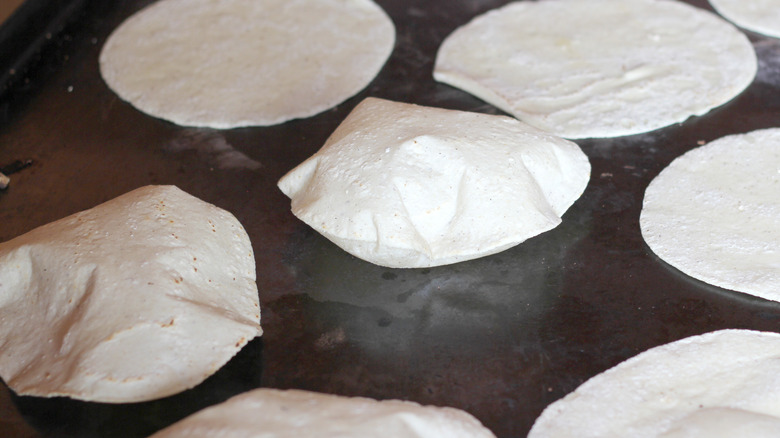The Key Masa Technique For Puffier Homemade Tortillas
We've all had dried-out grocery store corn tortillas. They crumble coming out of the bag, maybe curling around the edges. They split when you fold them; depending on your taco technique, they may fall apart in your hand or straight onto your plate (or worse, your lap). Evoking feelings ranging from frustrated panic to forlorn resignation, bad tortillas are the worst possible pitfall of a taco night.
There's a better way, and it's way easier than the sourdough bread habit you started in 2020. The easiest, of course, is to go to your local market and pick up a stack of freshly made tortillas. If you have a tía who is already making tortillas and you can go over for dinner, that's on par. But with just barely more work than that, you can make your own tortillas that would make any abuelita proud.
One bag of masa harina, a dream, and a hot pan is all you need to make a big stack of delicious corn tortillas. To keep your tortillas from being as crumbly as an old bag of grocery store ones, there's one important aspect: hydration.
Getting the hydration levels right
If your tortillas are expertly made, they'll puff up when you cook them. The determining factor here is to make sure the masa is well-hydrated. If it's too dry, you're at risk of getting those dreaded split tortillas, dumping your taco fillings everywhere.
In his book, "Tortillas: Wheat Flour and Corn Products," S.O. Serna-Saldivar determined that the appropriate hydration level for tortilla masa is 1.2 to 1.3 liters of water per kilogram of masa harina, or corn flour. By weight, that's a ratio of 1.2 ounces of water to 1 ounce of masa harina. By volume, that's approximately ⅔ cup water to 1 cup masa harina, or 1.3 cups water to the standard 2 cups of masa harina that most recipes call for to make a batch of 18 to 20 tortillas.
Your environment is going to make a difference in how well your masa harina hydrates. In a more humid environment, you might find that this is all you need for properly hydrated masa. In a less humid environment, you may need to bump this up to the 1 ½ cups of water called for in the recipe right on the bag of Maseca instant corn flour or even a full 2 cups of water as Compass & Fork puts in its recipe. You'll know the dough is hydrated correctly if it feels a little like Play-Doh and doesn't crack at the edges when kneaded — and there are a couple important steps to getting there.
Water temperature and rest time
A lesson in self care, tortillas need to be well-hydrated and well-rested or else they'll fall apart. Unlike quick-absorbing wheat flour, as Rick Martinez explains in his Effed it Up column for Bon Appétit, masa needs time. "Think of it as a dry sponge," he says. "Hard and porous when dry, soft and pliable when wet."
When you add the appropriate amount of water to your dough, your masa will start out sticky because the flour hasn't absorbed it yet. If you were to shape these right into tortillas and cook them, that water would cook off and your tortillas would crumble. In order to rehydrate each grain of dried, ground corn, your masa needs to be kneaded and rested.
In a wheat dough, you knead in order to develop gluten. In masa, it's a mechanical process to coax the tough grains of corn flour to hydrate and soften. Theoretically, you could give cold water and masa harina a good stir and leave it for hours to do this on its own, like how overnight oats become breakfast. To speed up the process, using warm (100-degree Fahrenheit) water and kneading the dough requires only a 20- to 30-minute rest before shaping and cooking your tortillas.
If done correctly, they won't stick to your hand with a quick pat and they'll puff up dramatically when cooked. The tortillas will be soft, pliable, and — most importantly — as structurally sound as they are delicious.


